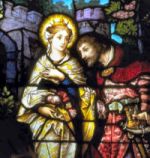Catholic Dictionary
Find accurate definitions of over 5,000 Catholic terms and phrases (including abbreviations). Based on Fr. John Hardon's Modern Catholic Dictionary, © Eternal Life. Used with permission.
Random Term from the Dictionary:
HEDONISM
The doctrine that pleasure is the goal of life and is man's highest good. By pleasure, true hedonists understand the admittedly imperfect enjoyments of this life only.
It was first formulated by the Greek philosopher Aristippus (c. 435-360 B.C.). Misinterpreting the teaching of Socrates (470-399 B.C.), who said that happiness is the end of life, Aristippus identified happiness with pleasure. He held that intellectual pleasures are higher than sense pleasures, but what matters is the pleasure here and now available. An act is good, and therefore virtuous, insofar as it gives present satisfaction.
Hedonism was refined by Epicurus (c. 341-270 B.C.), who joined it to the physical theories of Democritus (c. 460-370 B.C.). It is the only ethics consistent with pure materialism. For Epicurus the goal of life is not intense pleasure but an abiding peace of mind, a state of cheerful tranquillity. Above all one must avoid fear of any kind of god and fear of death. The wise man so regulates his life that, before death, he has the greatest amount of pleasure and the least amount of pain. Moderation is counseled not on moral grounds but on one's enablement to enjoy future pleasures in this life. Desires should be restricted to the bounds within which they can be satisfied. Whatever increases pleasure or one's general peace of mind is good, and anything that decreases it is bad. Modern hedonism is the preferred moral philosophy of those who deny or doubt the existence of a future life. (Etym. Greek h_don_, pleasure.)






